Meet Daria Figaszewska, a 28-year-old coffee professional currently residing in Warsaw as the Head Barista of LaCava Roastery. She has already almost a decade of experience in the coffee industry and is currently the youngest Authorized SCA Trainer in Poland, organising certified courses in Barista Skills and Brewing modules.
Daria took successfully part in various smaller coffee competitions in Poland such as Proinfuzja, Race to Racer, Dalla Corte Cup, Best Barista Challenge, Polish Aeropress Championships and Latte Art Throwdown as well as debuted on the stage of Polish SCA Championships: Brewers Cup, Barista Championship and Cup Tasters Championship. As she says herself, it was just a warm-up and she plans to return to the stage pretty soon!
With an impeccable focus and determination to learn, develop skills and then pass the know-how to her students, we are pretty sure that Daria will not only leave an incredible mark in the Polish specialty community but also way beyond!
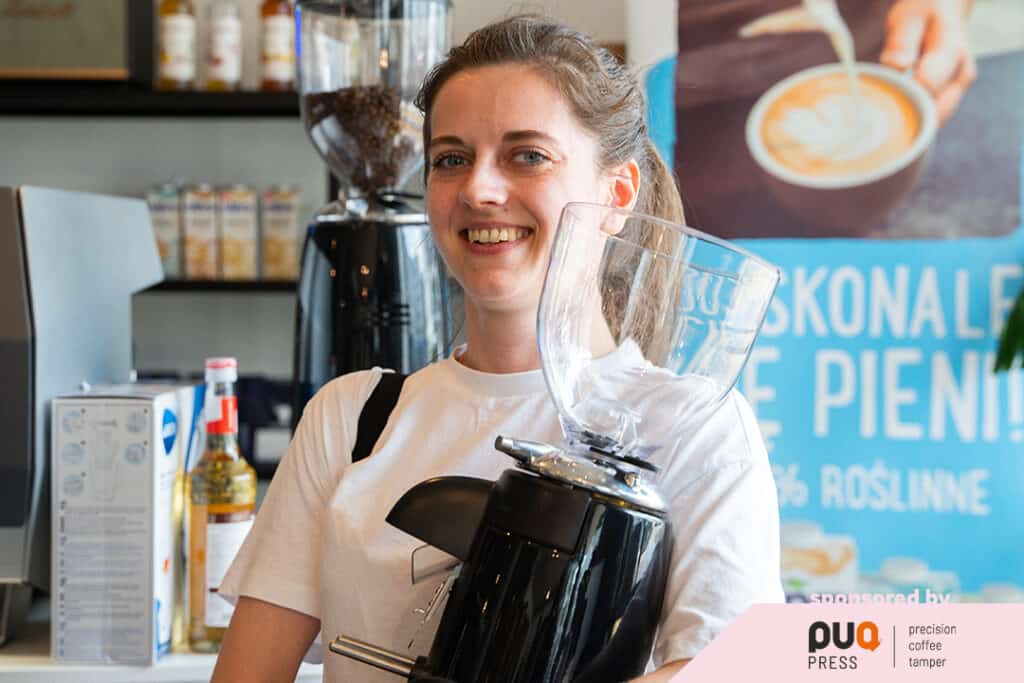
Daria, what is your first memory of coffee?
Coffee has always been in my life! My dad always drank crazy amounts of coffee. I started drinking it regularly when I was in high school. My morning routine was a visit to a small local café and small talk with the baristas who soon became my friends.
Did I like the first drip coffee in my life? Absolutely not! It was years ago in Opole. The barista offered it to me as an alternative to an Americano and I wasn’t impressed at all.
Everything changed when I started working in a cafe in Kraków. The turning point in my approach to coffee was a drip from Kenyan beans roasted by Karma. It was so surprising, juicy, full of black currants and other berries. I immediately stopped drinking coffee with milk and started exploring the topic of filter coffee.
What inspired you to pursue a career in the coffee industry, and how did you get started? What did you do before coffee?
There was nothing in my life before coffee and I don’t know if there will be anything other than coffee! I started my career as a barista almost a decade ago. At first, I was charmed by the atmosphere of the cafe, then I fell in love with specialty coffee and finally, I discovered that imparting knowledge and sharing experiences with others gives me the most satisfaction.
The specialty coffee industry is a fantastic choice because it offers a lot of very diverse career paths to choose from. Fortunately, I don’t have a strict daily routine at work. I’m constantly learning new things, overcoming new challenges and meeting a lot of inspiring people from the industry. Specialty coffee is a never-ending journey!
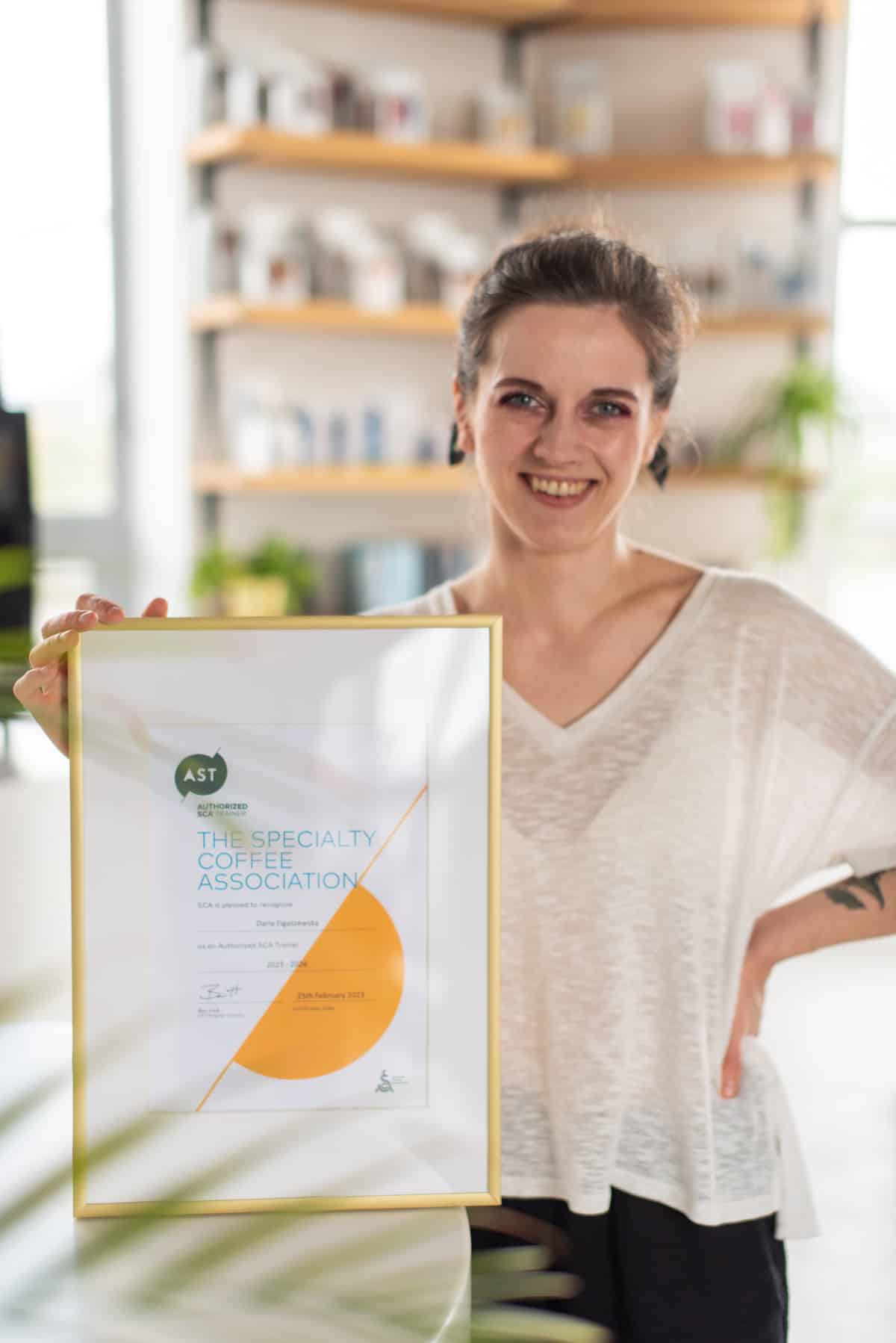
Tell us a bit about LaCava Roastery. What is your role there?
I am officially a Head Barista, which is a very broad job title. My scope of responsibilities can be divided into 3 most important departments – training, sales and event management. From AST’s perspective, the most important thing for me is training – both those within the SCA Coffee Skills Programme, as well as workshops and lectures that I give in friendly cafes or at industry events, where we often sell our coffees.
As you can see, individual sections are connected with each other. I am also the person who answers difficult questions from our clients, supports the marketing department and most importantly… takes care of the plants in our showroom and roastery!
If you wouldn’t work in coffee, what other profession would you like to work in?
What I like most about working with coffee is coffee – its complex sensory properties, the chemistry and physics behind it, but also the cultural aspects and working with people, especially during training and events. I think I would look for a job in a segment where I could use previously acquired skills related to sensory analysis and teaching others.
While working in the hospitality industry, I had the opportunity to gain basic knowledge about wine and spirits, so I would probably go in that direction. However, I cannot imagine spending the rest of my life working in an office. I would be more willing to drop everything and open a plant shop!
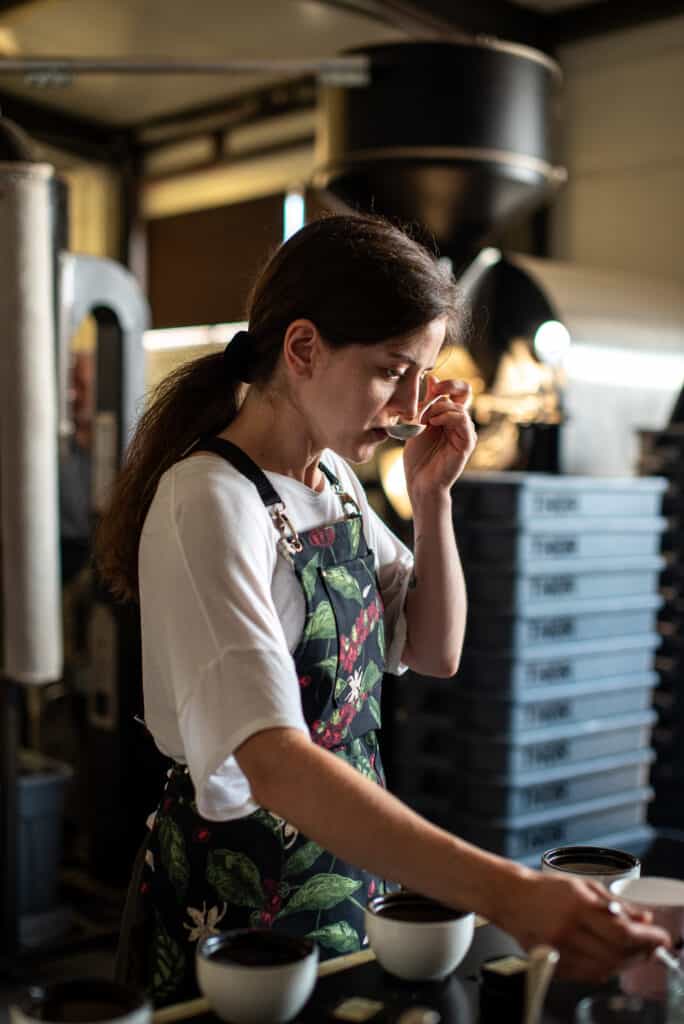

What is your favourite part of your work, and why?
I don’t have a strict routine and I like it very much! it requires great organization of work, but I never get bored and I can match the things on the list to the energy of a given day – sometimes I need to hide away with my laptop and update training materials, and sometimes I wake up in the morning, get in the car and drive 300 km then carry out a cupping event at a friendly cafe.
Regardless of my daily schedule – there is always room for coffee. I really like that first hour in the office when we all gather in the showroom, wait for the first batch of filter coffee and chat with each other. We have great people and a fantastic atmosphere at LaCava.
How do you stay motivated and inspired to keep improving your coffee-making skills?
It used to be that I needed to prove my competencies to myself and others. In hindsight, this approach was very unfair to myself, but it helped me get to where I am today which I am very happy about.
Now I get motivation from healthier reasons. Above all, I like the dynamics at work and the prospect of developing and improving my own skills motivates me to act. When I managed to get the SCA trainer’s authorization, I started to wonder – what’s next? Because it was my long-term goal, which I achieved much faster than expected. I am constantly looking for new opportunities to develop, to become a better trainer, to learn new sales techniques, and to improve the organization of events. I am also lucky to work with people who support me and motivate each other to constantly develop.
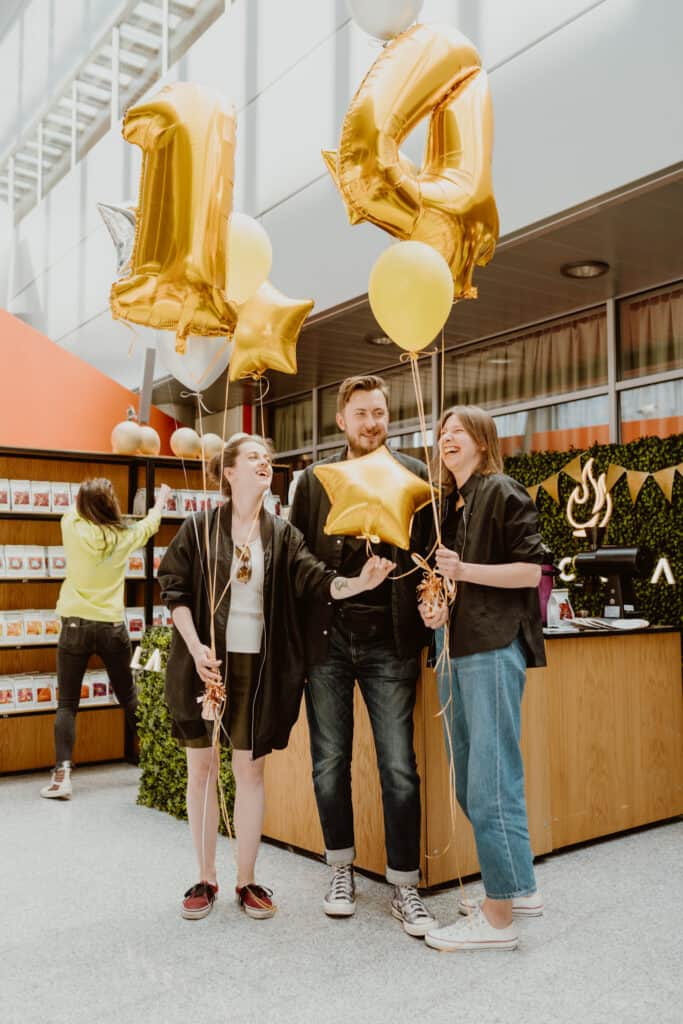
What are the current trends in cafes in your region? Are there any trends you promote yourself and would like to see more often in other places?
When going to a cafe, I usually reach for quite simple solutions – classic washed filter coffee, preferably batch brew. I always appreciate a good espresso, which is not easy to find even in Warsaw. From time to time I reach for coffees made with less obvious processing methods, such as anaerobic or other experimental ones, but this is not my everyday choice. I think that every year it becomes more and more difficult to surprise guests. Good quality washed Ethiopian coffee may suddenly turn out to be… boring!
When it comes to the beans themselves, I would like to see less obvious species such as Coffea Eugenioides or Fine Robusta way more on the market. The world doesn’t end with Arabica!
I hope that both locally and globally as an industry we will move towards sustainable development. Plant-based drinks are becoming more and more popular every year, and their quality and selection are growing. SCA has created the Coffee Sustainability Program, which I hope will also become popular in Poland in the coming years.
Can you tell me about a time when you had to train a new barista/customer? How did you approach the training process and what did you focus on?
I always try to approach my students as individually as possible. It is easier during individual training or in small groups, but it is also possible during workshops or cuppings. First of all, I always try to make my students feel at ease. Coffee is a great way to break the ice. We always start with small talk – what brings you here, what you expect from the training, what you do. It’s a great way to feel the energy and personality of the other party!
I try to use various teaching techniques during training. the more senses we engage, the more we will remember. The key is not to let the students get bored and lose concentration.
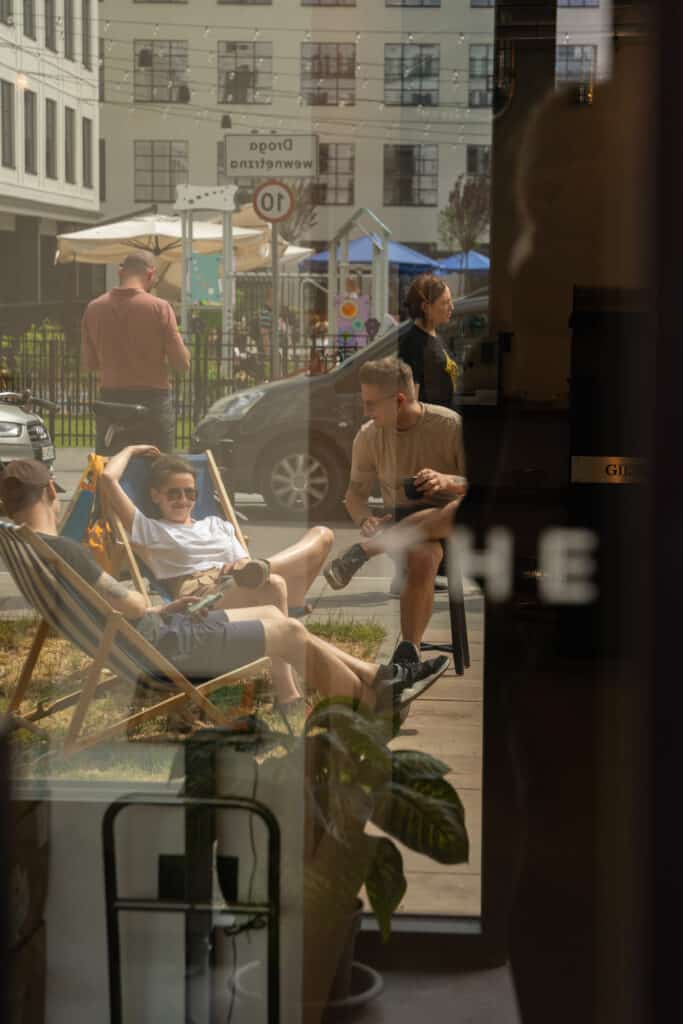
If there would be one piece of knowledge about coffee you’d like everyone to know, what would that be?
I think every person in the world who drinks coffee should know what the bean-to-cup process looks like. knowing how many hands are involved in coffee production and how time-consuming the process is changing the perspective on this product. Introduction to coffee training should be mandatory for every young barista. For example – did you know that you need to collect about 50 kg of cherries to obtain 10 kg of green coffee? The vast majority of specialty coffee is harvested by hand. To avoid it being too easy, it has to be processed as soon as possible after harvesting
What do you like more: training others or organizing cupping/tasting events? And why?
Training and cupping/tasting events are two completely different topics. It is definitely easier to have good contact with the students in a small group, but it is usually a very intense working day. On the other hand, cuppings or workshops usually last 1-2 hours and have a more casual format, but they require more effort to engage the participants and it is more difficult to start a dialogue with them, especially in a large group of people who don’t know each other..
However, both training sessions and cuppings give me a lot of satisfaction and I try to collect feedback after each one and analyze my own conclusions in order to do better with each performance.
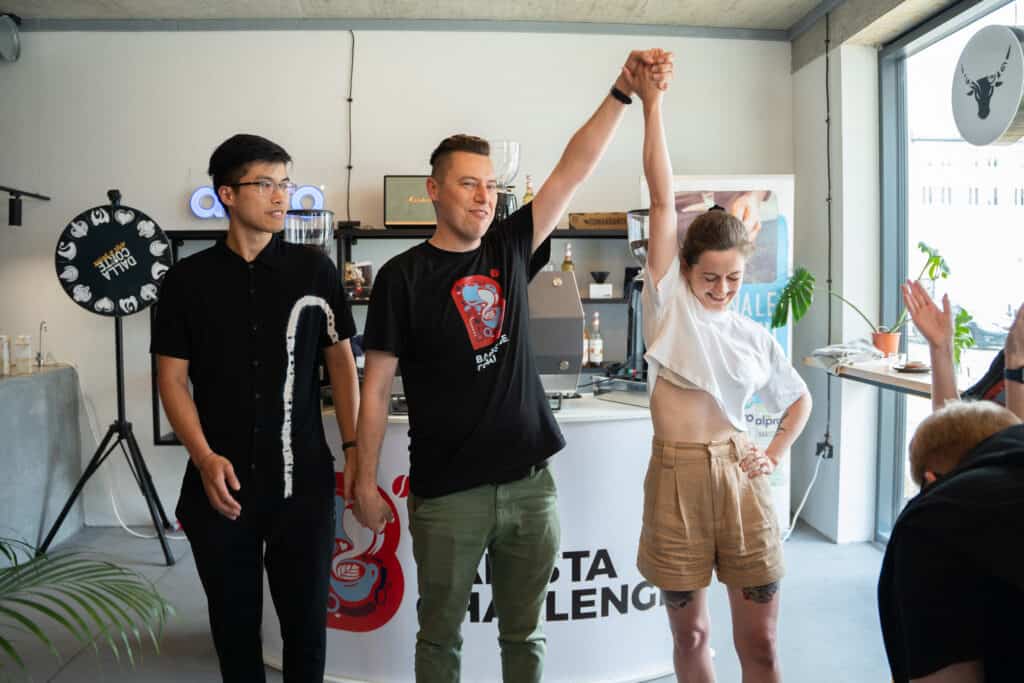
You also take part in a lot of coffee championships. Can you tell us more about them and what drives you to compete?
Taking part in coffee championships and training others, contrary to appearances, has a lot in common. I treat each such activity as a kind of performance. I started competing a few years ago in Proinfuzja. At that time I worked with great people in Gniazdo in Wrocław. We motivated each other, trained together and drove the whole team to subsequent rounds. Sometimes I really miss these times. Nowadays, I treat participation in championships as an opportunity to test and improve my skills, to show myself in the industry, and establish new contacts. Let’s be honest with ourselves – we go to industry events to meet friends who live hundreds of kilometres away as well as to meet new people!
After all, the championships should be fun, pleasure and drive us to develop and be better in our everyday work.
What coffee challenges are you looking forward to? Any new projects or collaborations?
I have a lot of small and large topics in my head. I constantly try to improve my training program, materials, and the method of implementing individual modules. I plan to attend the Educator Summit in November. This two-day event is a great opportunity to gain new knowledge, exchange experiences with experienced coffee trainers and motivate for further activities. In December, I will be attending the finals of BEST Barista Challenge – a national championship held in a very accessible form for young baristas. I won one of the qualifying rounds in June. In the meantime, there will still be qualifying rounds in several cities in Poland. I definitely encourage you to take part!
At the beginning of next year, there will also be the Polish Barista Championship and Brewers Cup. It may seem that there is still a lot of time, but this is the moment when it is worth thinking about them and start preparations.

Quick Fire Questions for Daria Figaszewska:
Would you serve filter coffee with milk if asked for it?
Yes.
Do you ever take sugar with your coffee?
A flavoured cafè latte is a kind of guilty pleasure!
Espresso or Filter coffee?
Filter coffee.
Do you aim for Sweetness, Acidity, or Body?
Balance!
Milky or Black?
Black.
Slurp or Spit?
Slurp.
Cake or Pastry with coffee?
Oh, why not both? But Pastry.
Favourite piece of barista equipment?
Kalita Dripper

